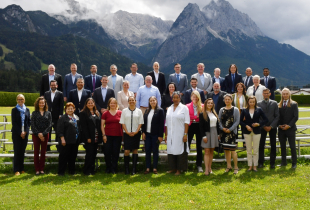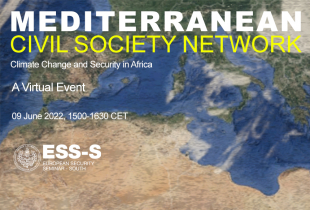
Policy Brief “Translating the Climate-Security-Nexus”
Background
This brief summarizes the results of a research workshop held at the George C. Marshall Center for European Security Studies from 24th to 28th July 2023. This workshop, organized by the Research and Policy Analysis Department of the Center, brought together 35 experts from 14 countries to scrutinize security implications of climate change on Europe’s Northern (High North/Arctic) and Southern Flank (MENA/West Africa).
Climate change is a planetary challenge with security policy implications and it requires immediate action. The ongoing processes, interrelations and interdependencies are non-linear and hard to grasp for the human brain. Therefore, security professionals need to develop ways to divide the complexity of climate change into manageable tasks. One important outcome of the workshop is that the regionalization of the challenges is key to develop solutions.
Physical change, like rising temperatures and changing precipitation patterns, has a direct influence on environmental conditions. These have an impact on the inhabitants of an ecosystem that includes humans. In addition to the effects on biodiversity in an ecosystem there are also effects on living and social conditions for humans which shape human behavior. Human actions not only change their direct social and natural surroundings but also influence the development of climate conditions in other regions and globally. This development is not circular. The changes are interrelated and might reinforce each other. Developments might not be easy to recognize until they reach a certain threshold or a tipping point. Some developments may be reversible, others are not.
Human reactions to changes are not predetermined. Changing living and social conditions influence individual and group decisions. This can lead to aggregated individual behavior, like migration or urbanization, or organized social behavior, like cooperation or conflict. Human security issues are not clearly separated from national and international security. The aggregation of multiple problems may not only challenge fragile states with weak governance, but also increase competition between regional and major powers. In either case, more crisis management will be called for at the state, regional and global levels.
About the Authors
Dr. Katrin Bastian is a Lecturer of Security Studies at the George C. Marshall European Center for Security Studies. Before joining the GCMC in autumn 2020, Dr. Bastian worked as the personal adviser to the Ambassador of the Principality of Liechtenstein in Berlin. During her 16 years of service at the embassy, she also worked as lecturer of international relations and EU foreign policy at Humboldt University Berlin (2005-2008) and at the University of California at Berkeley (2009).
Carlos Cantafio Apitz is an experienced management consultant currently pursuing a Master of Global Affairs (University of Toronto) and completing an internship at GCMC’s Research and Policy Analysis Department. Most recently, he was awarded a Canadian federal grant to conduct research on potential positive innovation externalities arising from establishing a “mission approach” to deliver on defense decarbonization in North America. He is also a Lupina-Innovation Policy Lab Fellow at the University of Toronto. Previously, he was a Manager at Deloitte Canada leading multi-disciplinary teams in delivering global enterprise transformation programs across the public, private and non-profit sectors.
Lt. Col. Falk Tettweiler works at the Research and Policy Analysis Department of the College of International and Security Studies at the George C. Marshall European Center for Security Studies. He has extensive expertise in European and German Security Policy which he gained during his work in the German Federal Ministry of Defense, the German Institute for International and Security Affairs (SWP), and the Federal Academy for Security Policy (BAKS). Falk has had many touchpoints with the Far East. Besides travelling the region both as part of official delegations and on his own, he has been dealing with Chinese philosophy and strategic thought for many years.
Dr. Frank Hagemann is Commander of the German Element, Deputy Dean Research and Head of Research and Policy Analysis Department of the College of International and Security Studies. His areas of expertise include European Security and Defense Policy, The Transatlantic Relationship and German Military History. He has, among other positions, been Assistant Military Representative to the Military Committees in Brussels, where he gained in-depth experience with regard to the military-political environment of the EU and NATO. Colonel Dr. Hagemann has also had two assignments to the German Ministry of Defense in Bonn and Berlin
The George C. Marshall European Center for Security Studies in Garmisch-Partenkirchen, Germany is a German-American partnership and trusted global network promoting common values and advancing collaborative geostrategic solutions. The Marshall Center’s mission to educate, engage, and empower security partners to collectively affect regional, transnational, and global challenges is achieved through programs designed to promote peaceful, whole of government approaches to address today’s most pressing security challenges. Since its creation in 1992, the Marshall Center’s alumni network has grown to include over 15,000 professionals from over 160 countries. More information on the Marshall Center can be found online at www.marshallcenter.org.
Marshall Center Security Insights are short analytical articles that identify, explain, and put into context significant current and emerging defense and security issues. The series is aimed at the needs of political decision makers and others who are looking for concise summaries and analyses of important contemporary security topics. Security Insights are generally authored by Marshall Center faculty and staff.
The articles in the Security Insights series reflect the views of the authors and are not necessarily the official policy of the United States, Germany, or any other governments.

